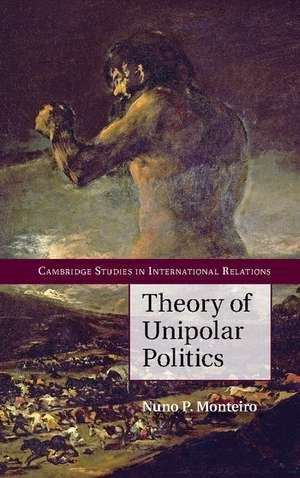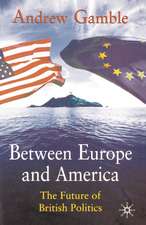Theory of Unipolar Politics: Cambridge Studies in International Relations, cartea 132
Autor Nuno P. Monteiroen Limba Engleză Paperback – 20 apr 2014
| Toate formatele și edițiile | Preț | Express |
|---|---|---|
| Paperback (1) | 248.39 lei 43-57 zile | |
| Cambridge University Press – 20 apr 2014 | 248.39 lei 43-57 zile | |
| Hardback (1) | 632.84 lei 43-57 zile | |
| Cambridge University Press – 20 apr 2014 | 632.84 lei 43-57 zile |
Din seria Cambridge Studies in International Relations
-
 Preț: 200.85 lei
Preț: 200.85 lei -
 Preț: 232.37 lei
Preț: 232.37 lei -
 Preț: 237.58 lei
Preț: 237.58 lei -
 Preț: 198.89 lei
Preț: 198.89 lei -
 Preț: 210.69 lei
Preț: 210.69 lei -
 Preț: 190.01 lei
Preț: 190.01 lei -
 Preț: 200.78 lei
Preț: 200.78 lei - 8%
 Preț: 401.23 lei
Preț: 401.23 lei -
 Preț: 229.56 lei
Preț: 229.56 lei -
 Preț: 265.70 lei
Preț: 265.70 lei -
 Preț: 200.08 lei
Preț: 200.08 lei -
 Preț: 207.81 lei
Preț: 207.81 lei -
 Preț: 158.77 lei
Preț: 158.77 lei -
 Preț: 162.49 lei
Preț: 162.49 lei -
 Preț: 231.47 lei
Preț: 231.47 lei - 11%
 Preț: 584.77 lei
Preț: 584.77 lei -
 Preț: 241.77 lei
Preț: 241.77 lei -
 Preț: 287.87 lei
Preț: 287.87 lei -
 Preț: 209.12 lei
Preț: 209.12 lei -
 Preț: 299.22 lei
Preț: 299.22 lei -
 Preț: 286.13 lei
Preț: 286.13 lei -
 Preț: 287.87 lei
Preț: 287.87 lei - 11%
 Preț: 641.67 lei
Preț: 641.67 lei - 11%
 Preț: 585.78 lei
Preț: 585.78 lei - 14%
 Preț: 843.23 lei
Preț: 843.23 lei -
 Preț: 303.80 lei
Preț: 303.80 lei -
 Preț: 284.78 lei
Preț: 284.78 lei -
 Preț: 279.76 lei
Preț: 279.76 lei -
 Preț: 285.75 lei
Preț: 285.75 lei -
 Preț: 324.24 lei
Preț: 324.24 lei -
 Preț: 290.16 lei
Preț: 290.16 lei -
 Preț: 291.69 lei
Preț: 291.69 lei -
 Preț: 392.52 lei
Preț: 392.52 lei -
 Preț: 315.99 lei
Preț: 315.99 lei
Preț: 248.39 lei
Nou
Puncte Express: 373
Preț estimativ în valută:
47.53€ • 49.76$ • 39.33£
47.53€ • 49.76$ • 39.33£
Carte tipărită la comandă
Livrare economică 07-21 aprilie
Preluare comenzi: 021 569.72.76
Specificații
ISBN-13: 9781107677753
ISBN-10: 1107677750
Pagini: 296
Ilustrații: 10 b/w illus. 7 tables
Dimensiuni: 152 x 226 x 25 mm
Greutate: 0.39 kg
Ediția:New.
Editura: Cambridge University Press
Colecția Cambridge University Press
Seria Cambridge Studies in International Relations
Locul publicării:New York, United States
ISBN-10: 1107677750
Pagini: 296
Ilustrații: 10 b/w illus. 7 tables
Dimensiuni: 152 x 226 x 25 mm
Greutate: 0.39 kg
Ediția:New.
Editura: Cambridge University Press
Colecția Cambridge University Press
Seria Cambridge Studies in International Relations
Locul publicării:New York, United States
Cuprins
1. Introduction; 2. Conceptualizing unipolarity; 3. The scope of unipolar strategic choice; 4. The sources of competition under unipolarity; 5. Competition in the post-Cold War; 6. The sources of conflict under unipolarity; 7. Conflict in the post-Cold War; 8. Conclusion.
Recenzii
'Theory of Unipolar Politics is a signal contribution to the scholarship on the nature and functioning of today's international system. Conceptually bold and smoothly and carefully written, it takes on central questions of the day with arguments and evidence that even skeptics have to confront. Long after dozens of speedily written tomes about contemporary rise-and-decline dynamics are forgotten, Monteiro's book will continue to shape scholarly inquiry.' William C. Wohlforth, Daniel Webster Professor of Government, Dartmouth College
'Nuno Monteiro has written a major book on unipolarity that makes it clear he is among the very best international relations theorists in the land. Most importantly, he explains why, contrary to conventional post-Cold War wisdom, unipolarity has not been peaceful, especially for the United States. Theory of Unipolar Politics will be a must-read for those in international relations for many years to come.' John J. Mearsheimer, R. Wendell Harrison Distinguished Service Professor of Political Science, University of Chicago
'Theory of Unipolar Politics fills an important gap in international relations theory by providing a full, careful exploration of unipolarity. Moving beyond debates about whether unipolarity will endure, Monteiro explains the central role of the unipole's grand strategy and its critical link to international conflict. Building on these arguments, this book provides valuable guidance for the United States in dealing with China's rise.' Charles Glaser, George Washington University
'… [Monteiro's] crisp account offers a strong theoretical argument and vivid empirical evidence … Impressively, he eschews determinist claims about both the inevitability of American decline and the perpetuation of America's international advantage. Instead, he identifies crucial choices that face policy makers in the United States, China, and in smaller states whose decisions will shape the evolution of international politics over the coming decades.' Avery Goldstein, David M. Knott Professor of Global Politics and International Relations, University of Pennsylvania
'Nuno Monteiro has written a major book on unipolarity that makes it clear he is among the very best international relations theorists in the land. Most importantly, he explains why, contrary to conventional post-Cold War wisdom, unipolarity has not been peaceful, especially for the United States. Theory of Unipolar Politics will be a must-read for those in international relations for many years to come.' John J. Mearsheimer, R. Wendell Harrison Distinguished Service Professor of Political Science, University of Chicago
'Theory of Unipolar Politics fills an important gap in international relations theory by providing a full, careful exploration of unipolarity. Moving beyond debates about whether unipolarity will endure, Monteiro explains the central role of the unipole's grand strategy and its critical link to international conflict. Building on these arguments, this book provides valuable guidance for the United States in dealing with China's rise.' Charles Glaser, George Washington University
'… [Monteiro's] crisp account offers a strong theoretical argument and vivid empirical evidence … Impressively, he eschews determinist claims about both the inevitability of American decline and the perpetuation of America's international advantage. Instead, he identifies crucial choices that face policy makers in the United States, China, and in smaller states whose decisions will shape the evolution of international politics over the coming decades.' Avery Goldstein, David M. Knott Professor of Global Politics and International Relations, University of Pennsylvania
Notă biografică
Descriere
Theory of Unipolar Politics studies the durability and peacefulness of the post-Cold War international system.













